Real People, Real Choices:
예시) Under Armour
• Which option should Neal pursue?
-Option 1: Approach the decision as a product problem, building new product offerings to get into retail ASAP. // 옵션 1 : 제품 문제로 결정에 접근하여 최대한 빨리 소매점에 진입 할 수있는 신제품을 구축
-Option 2: Approach the decision as a marketing problem. Stay the course with the current product line and invest resources into ramping up its messaging to target markets. // 옵션 2 : 결정을 마케팅 문제로 접근합니다. 현재 제품 라인을 유지하고 대상 시장에 대한 메시징을 늘리는 데 리소스를 투자하십시오.
-Option 3: Start over with a new business plan and rebuild the Baselayer product from the ground up. // 새로운 사업 계획으로 다시 시작하고 Baselayer 제품을 처음부터 다시 구축하십시오.
Layers of the Product Concept (제품 개념의 계층)
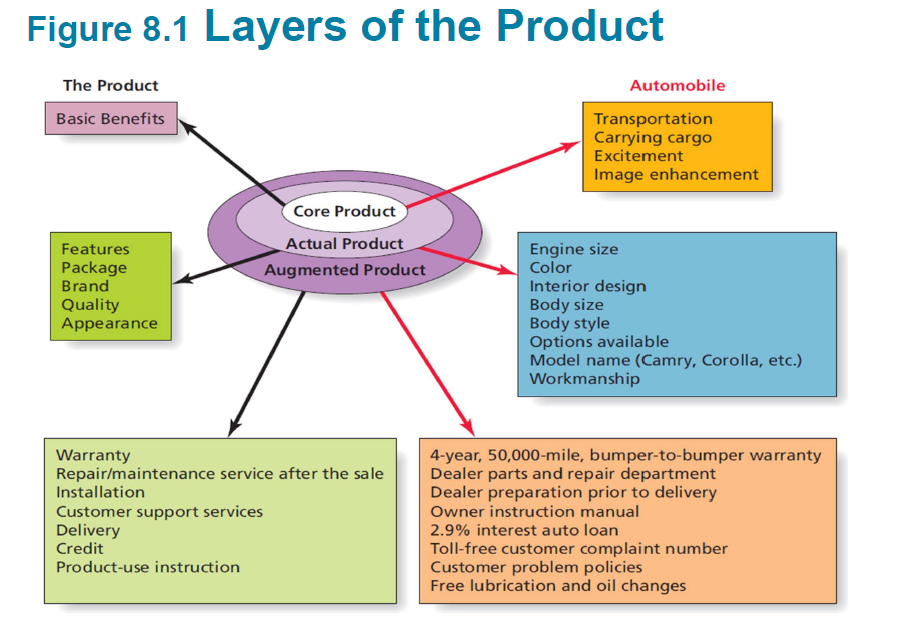
- A product represents all that a customer receives in an exchange. // 상품은 고객이 교환해서 받는 모든 것
- Marketers distinguish among three distinct “layers” of the product: // 마케터는 제품의 세 가지 계층을 구분.
- Core product 핵심 제품: the physical good or delivered service that supplies the desired benefits. Thus the core product includes specific features associated with the physical product, its appearance, the brand, or its package. // 원하는 혜택을 제공하는 물리적 상품 또는 전달 된 서비스. 따라서 핵심 제품에는 실제 제품, 외관, 브랜드 또는 패키지와 관련된 특정 기능이 포함
- Actual product 실제 제품
- Augmented product 증강 제품:
The augmented product includes the actual product PLUS other supporting features such as the warranty, service contract, credit and delivery services, installation and training or product use instructions. // 증강 제품에는 실제 제품과 보증, 서비스 계약, 신용 및 배송 서비스, 설치 및 교육 또는 제품 사용 지침과 같은 기타 지원 기능이 포함.
+실제 제품보다 쉽게 적용, 변경 가능
8.2 How Marketers Classify Products
• Based on how consumers feel about, purchase, and consume products-> How long products last/ How consumers buy products/ How businesses buy products // 소비자가 제품에 대해 느끼고, 구매하고, 소비하는 방식에 따라-> 제품 지속 기간 / 소비자가 제품을 구매하는 방법 / 기업이 제품을 구매하는 방법
How Long Do Products Last?
• Durable goods are consumer products that provide benefits over a period of months, years, or even decades. // 내구재는 수개월, 수년 또는 수십 년 동안 혜택을 제공하는 소비재
-Cars/ Furniture/ Appliances
• Nondurable goods are consumed over the short term. // 비내구재는 단기적으로 소비
-Magazines/ Sushi
Classification of Products
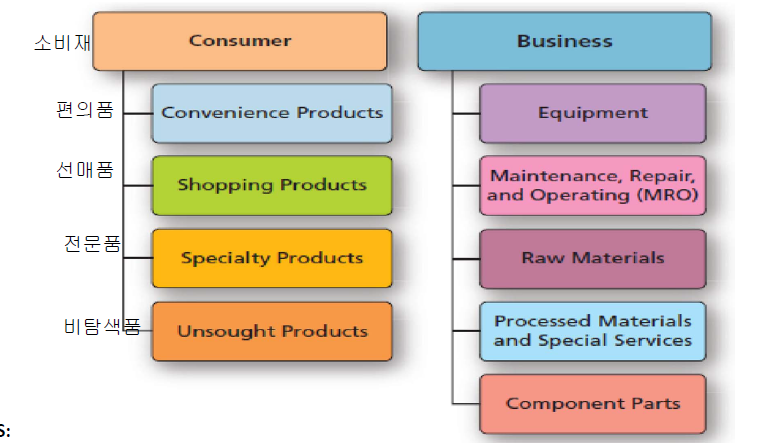
How Do Consumers Buy Products?
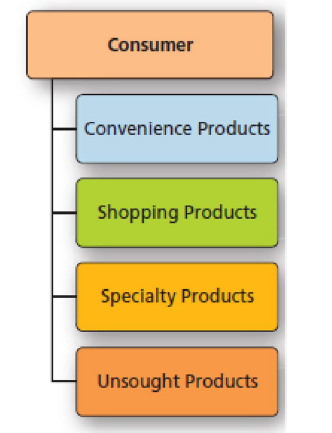
• Marketers also classify products based on where and how consumers buy the product. // 마케터는 또한 소비자가 제품을 구매하는 장소와 방법에 따라 제품을 분류
-Similar to how consumer decisions differ in terms of effort they put into habitual decision making vs. limited problem solving vs. extended problem solving // 소비자의 의사 결정이 습관적인 의사 결정에 투입하는 노력과 제한적인 문제 해결, 확장 된 문제 해결의 차이와 유사
Convenience Products
• Convenience products are typically nondurable goods or services bought with minimal effort. // 편의 제품은 일반적으로 최소한의 노력으로 구매하는 비 내구성 제품 또는 서비스
-Staples (e.g., milk, bread, gasoline) : basic or necessary items that we simply can’t do without. // 스테이플 제품은 우리가 없이는 할 수없는 기본 또는 필수 품목
-Consumer packaged good (CPG) or fast-moving consumer good (FMCG)
-Impulse products : Impulse products are bought on the spur of the moment. Package designs of items like candy bars need to be bright and colorful so they catch the consumers attention, enhancing the likelihood of an impulse by. // 임펄스 제품은 순간적으로 구매됩니다. 캔디 바와 같은 품목의 패키지 디자인은 밝고 화려해야 소비자의 관심을 끌고 충동의 가능성을 높일 수 있습니다.
-Emergency products : Emergency products are items that have to be purchased immediately because of dire need. Because immediate access to the product takes priority, consumers may not consider price or product quality when making their choice. // 긴급 상품은 긴급한 필요로 인해 즉시 구매해야하는 품목. 제품에 대한 즉각적인 접근이 우선이기 때문에 소비자는 선택할 때 가격이나 제품 품질을 고려하지 않을 수 있음
• Consumers expect convenience products to be low priced and widely available. // 소비자들은 편의 제품이 저렴하고 널리 사용되기를 기대
Shopping Products
• Shopping products are goods and services for which consumers will spend time and effort to gather information on price, product attributes, and product quality.
쇼핑 제품은 소비자가 가격, 제품 속성 및 제품 품질에 대한 정보를 수집하는 데 시간과 노력을 기울이는 상품 및 서비스
-Computers/ TVs/ Appliances // 컴퓨터 / TV / 가전
• Consumers are more likely to compare alternatives before they buy. // 소비자는 구매하기 전에 대안을 비교할 가능성이 더 높음
Specialty Products
• Specialty products have unique characteristics that are important to buyers at almost any price. //특수 제품은 거의 모든 가격에서 구매자에게 중요한 고유 특성을 가지고 있음
-Generally, an extended problem-solving purchase that requires a lot of effort to choose
-Marketers have to go to a lot of effort to make their products stand out. // 마케터는 자신의 제품을 돋보이게 만들기 위해 많은 노력을 기울여야함
-Customers tend to be very loyal. // 고객은 매우 충성스러운 경향
(ex) Rolex
Unsought Products
- Unsought products are goods and services for which a consumer has little awareness or interest until a need arises. // 소비자가 필요가 생길 때까지 인식이나 관심이 거의없는 상품 및 서비스
- Unsought products are those in which consumers have little interest until a need arises.
-Retirement plans 퇴직 계획
-Life insurance 생명 보험
• Often require a good deal of advertising or personal selling to interest buyers // 종종 관심있는 구매자에게 상당한 양의 광고 또는 개인 판매를 요구
Business to Business Products
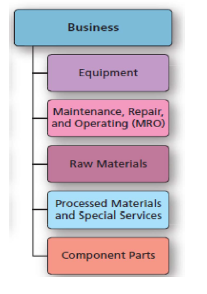
- Marketers classify B2B products based on how organizations use them. // 마케팅 담당자는 조직이 사용하는 방식에 따라 B2B 제품을 분류
- Knowledge of customer product use enables marketers to: // 고객 제품 사용에 대한 지식을 통해 마케팅 담당자는 다음을 수행 할 수 있음.
-improve product designs. // 제품 디자인을 개선
-craft an appropriate marketing mix. 적절한 마케팅 믹스를 만듦
Categorizing B2B Products
• Equipment, often called installations or capital equipment, is used in daily operations. // 종종 설비 또는 자본 장비라고 하는 장비는 일상적인 작업에 사용
• Maintenance, repair, and operating (MRO) goods are consumed relatively quickly. // 유지 보수, 수리 및 운영 (MRO) 상품은 상대적으로 빠르게 소비
• Raw materials are products of fishing, lumber, agricultural, and mining industries used to in the final product. // 원자재는 최종 제품에 사용되는 어업, 목재, 농업 및 광산업의 산물
• Processed materials: produced by firms when they transform raw materials from their original state // 가공 된 재료 : 기업이 원료를 원래 상태에서 변형 할 때 생산
• Specialized services: services which are essential to the organization but are not a part of the actual production of a product // 전문 서비스 : 조직에 필수적이지만 제품의 실제 생산에는 포함되지 않는 서비스
• Component parts: manufactured goods or subassemblies of finished items an organizations needs to complete their own goods // 구성 부품 : 조직이 자체 상품을 완성하는 데 필요한 완제품 또는 완제품의 하위 어셈블리
Classification of Consumer and B2B Products
• Categorizing consumer and B2B products helps marketers to: // 소비자 및 B2B 제품을 분류하면 마케팅 담당자가 다음을 수행 할 수 있음.
-develop better new products // 더 나은 신제품 개발
-improved marketing mixes // 향상된 마케팅 믹스
• Product durability, purchase process, and product use provide useful information.// 제품 내구성, 구매 프로세스 및 제품 사용은 유용한 정보를 제공
-Are consumer product classifications for a given product permanent? // 특정 제품에 대한 소비자 제품 분류는 영구적입니까?
-Can you think of products that have moved from one class to another? // 한 클래스에서 다른 클래스로 이동 한 제품을 생각할 수 있습니까?
8.3 “New and Improved!”: The Process of Innovation
• Innovation is a hot topic in the boardroom today! // 혁신은 오늘날 이사회에서 뜨거운 주제
• For marketers, an innovation is anything customers perceive as new or different. // 마케팅 담당자에게 혁신이란 고객이 새롭거나 다른 것으로 인식하는 모든 것
-May be a minor or game changing alteration to an existing good or service // 기존 재화 또는 서비스에 대한 사소한 변경 또는 게임 체인저 일 수 있음
-May be a brand new product entirely // 완전히 새로운 제품일 수 있음.
Types of Innovations
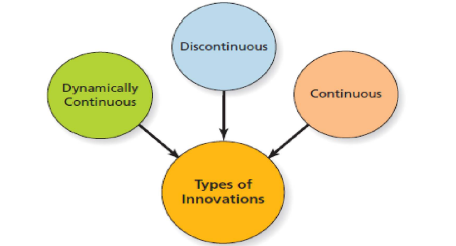
Continuous Innovation
• A continuous innovation is a modification to an existing product. // 지속적인 혁신은 기존 제품에 대한 수정
-Customer doesn’t have to learn anything new // 고객은 새로운 것을 배울 필요가 없음
• A knockoff is a new product that copies, with slight modification, the design of an original product. // 모조품은 원본 제품의 디자인을 약간 수정하여 복사하는 새 제품
-Harder to legally protect designs than technological innovations // 기술 혁신보다 법적으로 디자인을 보호하기가 더 어려움.
Dynamically Continuous Innovation
• A dynamically continuous innovation is a pronounced modification to an existing product. // 동적으로 지속적인 혁신은 기존 제품에 대한 확연한 수정임.
• Requires a modest amount of learning for consumers to use // 소비자가 사용하기 위해 적당한 양의 학습이 필요함.
Discontinuous Innovation
• To qualify as a discontinuous innovation, the product must create major change in the way people live. // 불연속적인 혁신으로 인정 받으려면 제품이 사람들의 생활 방식에 큰 변화를 가져와야 함.
-Consumers have to learn a great deal in order to be able to effectively use the product. // 소비자는 제품을 효과적으로 사용하기 위해 많은 것을 배워야 함.
-What’s the next “killer app?”
Convergence
• Convergence is the coming together of two or more technologies to create a new system. // Convergence는 새로운 시스템을 만들기 위해 둘 이상의 기술을 결합하는 것
• One of the most talked about forms of dynamically continuous innovation // 가장 많이 언급되는 동적 연속 혁신 형태 중 하나
8.4 New Product Development (NPD)
• The new product development model is based on categories of R&D expenditures. // 신제품 개발 모델은 R & D 지출 범주를 기반
-In most organizations, this process is well-defined and systematic. // 대부분의 조직에서 이 프로세스는 잘 정의되고 체계적임.
• R&D investment is a central metric for measuring an organization’s commitment to innovation relative to its rivals. // R & D 투자는 경쟁 업체에 비해 혁신에 대한 조직의 노력을 측정하기위한 중심 측정 기준
Phases in New Product Development
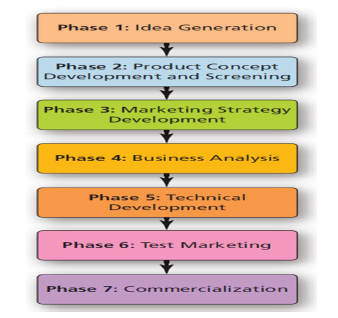
Phase 1: Idea generation (Ideation)
-Marketers use a variety of sources to come up with ideas for new products. // 마케터는 다양한 소스를 사용하여 신제품에 대한 아이디어를 제시
-Value co-creation via collaboration with customers, salespeople, service personnel, and other stakeholders // 고객, 영업 사원, 서비스 담당자 및 기타 이해 관계자와의 협업을 통한 가치 공동 창출
Phase 2: Product‐concept development and screening
-Product ideas are tested for technical and commercial success. // 제품 아이디어는 기술적 및 상업적 성공을 위해 테스트됨.
Phase 3: Marketing strategy development
-Developing a plan including identifying the target market // 목표 시장 식별을 포함한 계획 개발
Phase 4: Business analysis
-The product’s commercial viability is assessed. // 제품의 상업적 실행 가능성이 평가됨.
Phase 5: Technical development
-Engineers work to develop and refine a working prototype. // 엔지니어들은 작동하는 프로토 타입을 개발하고 개선하기 위해 노력
-Firm may need to apply for a patent. // 기업은 특허를 신청해야 할 수도 있음.
(ex) Even continuous innovations such as new beverage flavors may require multiple prototypes and consumer tests as part of the technical development phase. //새로운 음료 맛과 같은 지속적인 혁신조차도 기술 개발 단계의 일부임. 많은 프로토 타입과 소비자 테스트가 필요할 수 있음.
Phase 6: Market Test
-The complete marketing plan is tested in a small geographic area similar to the larger market or via a simulated market test. // 전체 마케팅 계획은 더 큰 시장과 유사한 작은 지역에서 또는 시뮬레이션 된 시장 테스트를 통해 테스트됨.
Phase 7: Commercialization
-The new product is launched into the market. // 새로운 제품이 시장에 출시
-Full-scale production, distribution, advertising, and sales promotion are begun. // 본격적인 제작, 유통, 광고, 판촉 시작
8.5 Adoption and Diffusion of New Products
• Product adoption is the process by which a consumer or business customer begins to buy and use a new good, service, or idea. // 제품 채택은 소비자 또는 기업 고객이 새로운 상품, 서비스 또는 아이디어를 구매하고 사용하기 시작하는 프로세스
• Diffusion is the process by which the use of a product or innovation spreads throughout a population. // 확산은 제품 또는 혁신의 사용이 인구 전체에 퍼지는 과정
Adoption Pyramid
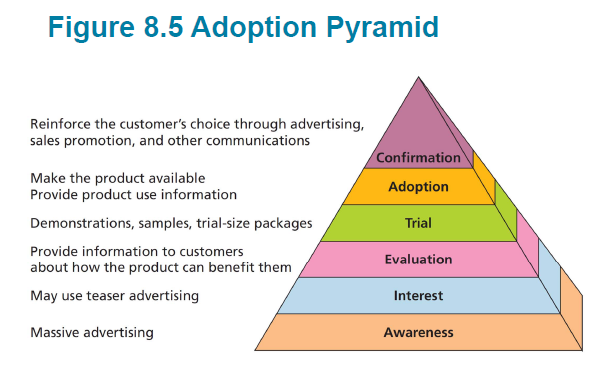
• Awareness 인식
-Customers see that innovation exists. //고객들은 혁신이 존재한다는 것을 알고 있음
-Media blitz // 미디어 블리츠
• Interest
-Customers see how the product satisfies a need. // 고객은 제품이 요구 사항을 어떻게 충족하는지 확인
-Seek out information //정보 찾기
• Evaluation 평가
-Costs and benefits 비용 및 혜택
-Impulse purchase 충동 구매
• Trial 평가판
-Actually experience or use the product // 실제로 제품을 경험하거나 사용
• Adoption
-Purchase is made
• Confirmation
-Expected versus actual benefits and costs // 예상 대 실제 혜택 및 비용
8.6 Categories of Adopters
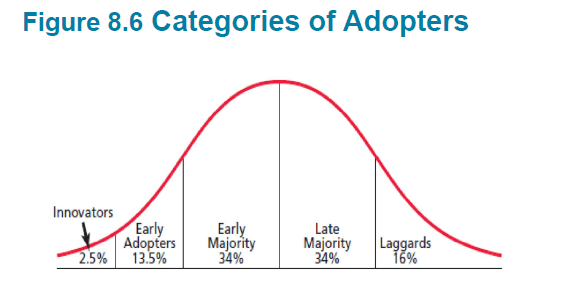
- Some consumers are eager to try new innovations, while others may take a “wait and see” attitude, or be downright skeptical of new offerings. //일부 소비자는 새로운 혁신을 시도하기를 열망하는 반면, 다른 소비자는 "기다렸다가 보는"태도를 취하거나 새로운 제품에 대해 완전히 회의적 일 수 있음.
- The simple fact is that different people adopt innovations at different times. // 간단한 사실은 사람들마다 다른시기에 혁신을 채택한다는 것
• Innovators 혁신가
-Extremely adventurous
-Risk takers
-Well-educated
• Early Adopters 얼리어답터
-Concerned about social acceptance
-Heavy media users
• Early Majority 초기 대다수
-Avoid being first or last/ Middle class
-Deliberate and cautious
• Late Majority
-Older/ Conservative/ Lower than average education
and income 고령자 / 보수적 / 평균 학력 및 소득 이하
• Laggards 후발
-Lower education and income/ Bound by tradition
Product Factors That Affect the Rate of Adoption
• The degree to which a new product has each of these characteristics affects the speed of diffusion. // 신제품이 이러한 각 특성을 갖는 정도는 확산 속도에 영향을 미칩니다.
- Relative advantage : the degree to which a consumer perceives a new product as offering superior benefits. // 소비자가 신제품이 우수한 혜택을 제공한다고 인식하는 정도
-Greater relative advantage means faster adoption
- Compatibility 적합성 : the extent to which an innovation is consistent with existing cultural values, customs, practices, and norms. // 혁신이 기존의 문화적 가치, 관습, 관행 및 규범과 일치하는 정도
-Lack of perceived compatibility slows adoption
- Complexity : the degree to which consumers perceive a new product as difficult to understand and use.
-Higher the degree of perceived complexity, the slower the rate of adoption. // 인지 된 복잡성의 정도가 높을수록 채택 속도가 느려짐.
- Trialability 시험 가능성 : Trialability refers to the ease of sampling a new product and its benefits. // 시험 가능성은 신제품 샘플링의 용이성과 그 이점을 의미.
-Lower costs associated with trial usage can speed rate of adoption. // 평가판 사용과 관련된 비용을 낮추면 채택 속도를 높일 수 있음.
- Observability 관찰 가능성 : the degree to which others can see the new product and the benefits it provides. // 다른 사람들이 신제품과 그것이 제공하는 이점을 볼 수있는 정도
-An innovation that is more visible will drive more word of-mouth communication. // 눈에 띄는 혁신은 더 많은 입소문을 유도

르네상스형 인재 !!@! 한양대 에이스!!